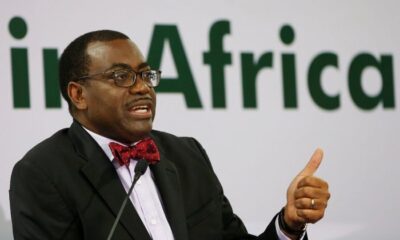Business
Local Content Devt in ICT to Top Agenda in 2017
Published
8 years agoon

- Local Content Devt in ICT to Top Agenda in 2017
Although 2016 was perceived as a tough year for telecoms and information technology (IT) business, ICT stakeholders are of the view that 2017 could be a better year if certain critical measures are put in place by the government to drive development of the industry. Among all identified factors that will shape ICT activities in 2017, the Nigerian Local Content Development, topped the agenda.
From broadband development and penetration, to spectrum management as well as protecting ICT infrastructure and licensing of additional InfraCos, up to regulatory framework, quality of service and data floor price, stakeholders strongly believe that if the issue of local content development and patronage are full addressed, it would automatically take care of all other factors that needed to be addressed in the ICT sector in 2017.
The Nigerian local content law in ICT
The Chief Executive Officer of Teledom Group, Dr. Emmanuel Ekuwem, is one stakeholder that is passionate about developing the Nigerian local content law in ICT, which he said, would spur development in the ICT sector.
According to Ekuwem, “the economy is down with recession and the best way to move Nigeria out of recession is for government to develop her local content law by encouraging locally developed products and their patronage. If this is achieved, it would not only create jobs, but also boost GDP growth as well as the Nigerian economy.”
He therefore insisted on patronage, protection, projection and promotion of the Nigerian local content development. To achieve this, Ekuwem said government must put the right policies in place and ensure full implementation of such policies across boards.
“What Nigeria needs at the moment is a general consumer content law that will drive local content development in the ICT sector,” Ekuwem said, while frowning on a situation where the telecoms operators depended largely on importation of telecoms infrastructure, to the detriment of local manufacturers.
He expressed his displeasure over importation of items like switches and routers by telecoms operators, insisting that such items could be manufactured in the country, if the right policies are put in place, and backed with proper implementation strategies. Ekuwem is of the view that if local content development is encouraged in the ICT sector, it will boost development and create additional jobs for the unemployed youths of the county.
President, Institute of Software Practitioners of Nigeria (ISPON), Mr. James Emadoye is another stakeholder who believes government must wake up to its responsibilities in 2017 in the area of policy implementation that will drive local content development in the ICT sector.
Emadoye, who blamed the federal government for policy inconsistencies and poor implementation, gave an instance where the federal government, through the former Secretary to the Government of the Federation, Chief Ufot Ekaette, wrote a letter with Ref No SGF/OP/1/S.3/VII/795, to head of civil service commission, ministries department and agencies (MDAs) of government, on the need to patronise made in Nigeria products, including procurement of locally assembled computers and locally developed software. He said the letter directed all federal MDAs to comply with the directive, but expressed deep dissatisfaction that such directive was never implemented. The situation, he said, has grounded several local manufacturers of ICT products and equipment in the country, while importation of ICT equipment still thrives.
Emadoye therefore called on government to expedite action in putting in place policies and the right implementation that would support local content development in a sector where there are willing and talented people that could develop ICT equipment with global standard and best practice.
The President, Association of Telecoms Companies of Nigeria (ATCON), Mr. Olusola Teniola, said local content must be a priority in 2017 for the ICT industry in general and that government should further collaborate with industry, civic society and academia to find the best fit for Nigeria in ensuring that capital flight is minimised in the areas of software, digital content and data hosting.
Spectrum licensing
In the area of spectrum allocation and sales, Teniola said the ICT industry needs further allocation and utilisation of spectra that would contribute to the growth of mobile broadband penetration in rural areas of the country and that the options presented at the Spectrum Trading Forum hosted by the Nigerian Communications Commission (NCC) in 2016, should be explored and implemented in 2017, specifically in consideration of the Nigerian terrain. He added that the migration of analogue TV to digital TV should be a major focus during 2017 and this should free up more broadband type spectra that will allow high speed or superfast broadband to be easily rolled out.
“Until these are achieved, 2017 may witness more ‘refarming’ of spectrum usage amongst the mobile network operators (MNOs) and a gradual push to 4G type speeds with NCC having to put in place more enforcement to ensure spectrum is effectively being used to meet service quality standards across the industry,” he said.
In the same vein, Ekuwem said the Digital Switch Over (DSO) plan by the federal government to migrate the country from analogue to digital broadcasting, should be given serious attention, since the successful migration will free up spectrums that would be used for broadband penetration.
Broadband penetration
In the area of broadband infrastructure and penetration, Teniola is of the view that 2017 is the year when we need to have implementable programmes in place to ensure we are on track to achieve the National Broadband Plan (NBP) of 30 per cent penetration by end of 2018. The ICT industry, he said, would need all the government agencies in charge of and responsible for infrastructure at state level to work with and support the roll-out of much needed fibre optic metro infrastructure that supports the whole eco-system to deliver on the promises made in the NBP.
“Furthermore, the industry needs government policies in place that will attract much needed investments to support the capital expenditure programmes that should be undertaken to realise the country’s vision of a digital transformation through smart cities, e-Government and Internet of Things (IoT). The infrastructure that is rolled out for support broadband services needs to be fully protected from vandalisation, theft and destruction and therefore the enforcement of the Critical National Infrastructure (CNI) under the Cybercrime bill needs to be enacted without any further delay,” Teniola said.
Ekuwem said the country’s broadband plan should be vigorously pursued and implemented further in 2017, since several factors in ICT development revolves around broadband.
The Executive Vice Chairman of NCC, Prof. Umar Garba Danbatta, said NCC would intensify action to ensure deeper penetration of broadband infrastructure, using its 8-Point Agenda.
“Our decision to focus on facilitation of broadband penetration was guided by the empirically proven, and globally acknowledged potentials of this service to promote socio-economic transformation, citizen empowerment, and ease of governance. This is why we have taken very practical steps to actualise the Open Access Model of infrastructure required to drive broadband penetration. This is why we are currently inviting bids for broadband infrastructure deployments in five geopolitical zones of the country, having licensed two operators for Lagos and North Central Zone of the country for the same infrastructure.
We have also issued licenses in the 2.6GHz Spectrum Band and allocations of spectrum to service providers in the 5.4GHz Band began in the first week of December 2016.
Some service providers are already rolling out these services, including the Long Term Evolution, LTE-based services.
“We have been able to develop a broadband regulatory framework, with a monitoring committee set up to align our various efforts in this direction. So in 2017, we will work to meet the expectations of the approved National Broadband Implementation Plan, which has set a target of 30 per cent broadband penetration by 2018. The encouraging news is that Nigeria’s broadband penetration as empirically adjudged by the global telecom regulator, the International Telecommunications Union, ITU, is 21 per cent. This means that our efforts are yielding desired results,” Danbatta said.
Licensing of InfraCos
In the area of licensing of Infrastructure Companies (InfraCos) that will drive deployment of broadband infrastructure across the country, Teniola said for Nigeria to realise the National Backbone Network (NBN) the Open Access Model needs to be fully implemented to the ‘letter’ and hence the remaining licences need to be given out within the first quarter of 2017.
“Also, issues surrounding the project execution in each geo-political region will need speedy intervention by federal and state government’s collaboration to avoid experiences observed in 2016 with the InfraCos that were awarded licences to cover Lagos and North Central regions. We must avoid the mistakes already made to ensure the success of the overall intent,” Teniola said.
ICT policies and regulations
In the area of ICT policies and telecoms regulation, Teniola insisted that telecoms regulation would need to balance Over the Top Technology (OTT) presence alongside the current industry setup of strong MNOs and a few Internet Service Providers (ISPs) against the uncertainty of the Nigerian economic situation vis-a-vis infrastructure investments and capital deployed to achieve it.
“In 2017 the telecoms industry needs to see an immediate clarity on data price floor and other intervention instruments that will need to be explored and maybe introduced into the industry to ensure competition doesn’t stifle innovation for the long term growth of industry as a whole. 2017 is the year where the NCC will be looked upon by all industry players for a level playing field to exist in the emerging broadband data era in Nigeria,” Teniola said.
Is the CEO and Founder of Investors King Limited. He is a seasoned foreign exchange research analyst and a published author on Yahoo Finance, Business Insider, Nasdaq, Entrepreneur.com, Investorplace, and other prominent platforms. With over two decades of experience in global financial markets, Olukoya is well-recognized in the industry.

You may like
-
70 Million Poorest of The Poor Nigerians To Get N75,000 From FG
-
Nigeria Surpasses OPEC Quota with 1.51 Million bpd, Targets 2.06 Million in 2025
-
Global Investors Commit $7.6 Billion to Nigeria’s Development at AIF 2024
-
Nigeria-China Trade Strengthened as Grimaldi Introduces Direct Shipping Line
-
Nigeria’s GDP Records 3.46% Growth in Q3 Spurred by Non-Oil Sector
-
President Tinubu Presents N47.9trn 2025 Budget As Debt Servicing, Security, Infrastructure Take Lion Shares













